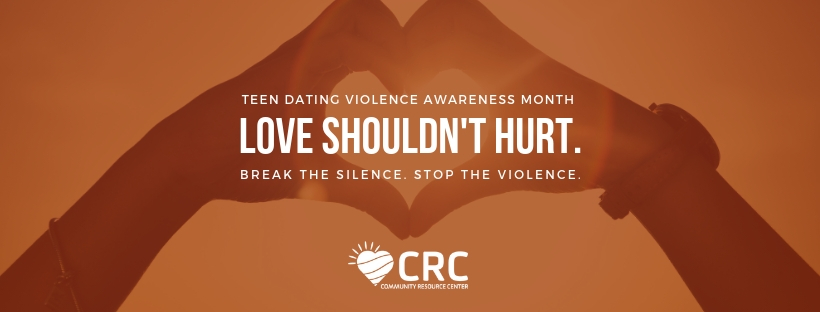
February is Teen Dating Violence Awareness Month
If you think you are in an abusive relationship and want to talk to an advocate, call Community Resource Center’s 24/7 Domestic Violence Hotline: 1-877-633-1112. If you are in danger, call 911. Or you can text loveis to 22522 to reach an advocate from loveisrespect.
Dating violence is more common than many people think. One in three teens in the U.S. will experience physical, sexual or emotional abuse by someone they are in a relationship with before they become adults. And nearly half (43%) of dating college women report experiencing violent and abusive dating behaviors.
Statistics are provided by Break the Cycle 2011 College Dating Violence and Abuse Poll and Loveisrespect.org. The contents on our website are for informational purposes only.
Help us spread awareness and stop dating abuse before it starts!
Dating Abuse is Common
Dating abuse can happen to anyone, regardless of age, financial status, race, gender, sexual orientation or background, and if we want to raise awareness about it and help prevent it, we need to start with the basics.
Dating abuse is rooted in power and control. Dating abuse is a pattern of behaviors one person uses to gain and maintain power and control over their partner. Many people assume abuse means that physical violence is happening, but that’s not always the case. Abuse comes in many forms—it’s not just physical. Young people who abuse their partners do so because they feel they need to exercise power and control over the other person—and that’s never OK.
Every day, our national partner, loveisrespect.org receives hundreds of calls, chats and texts from young people across the country who are experiencing abuse in their relationship. We know that in a single year, nearly 1.5 million high school students nationwide experience physical abuse from a dating partner. When college-aged students were asked to consider if they have ever been in an abusive relationship, 29% of women and 17% of men reported that they had. College students are not equipped to deal with dating abuse – 57% say it is difficult to identify and 58% say they don’t know how to help someone who’s experiencing it. One in three (36%) dating college students has given a dating partner their computer, online access, email or social network passwords and these students are more likely to experience digital dating abuse.
Types of Abuse:
PHYSICAL • Hitting • Slapping • Choking • Kicking • Shoving • Biting • Force-feeding • Assaulting
EMOTIONAL & VERBAL • Putting you down • Embarrassing you in public, threatening you in any way • Telling you what to do, telling you what to wear
SEXUAL • Pressuring or forcing you to do anything sexual without your consent like forcing you to have sex or perform sexual acts that you are not comfortable with • Restricting access to birth control • Forcing you to watch pornography or participate in pornographic videos, sexting
FINANCIAL • Taking your paychecks • Not paying bills • Preventing you from working • Controlling where and how you work
DIGITAL • Sending threats via text, social media or email • Stalking or humiliating you on social media • Logging into your social media or email accounts without permission • Forcing you to share passwords Drugs and alcohol can affect a person’s judgment and behavior—but they do not excuse abuse or violence.
Healthy Relationships
What is a healthy relationship?
A healthy relationship requires honest communication, trust, safety, and respect. This applies to all relationships, regardless of each person’s sexual orientation. While different people may define relationships in different ways, there are a few key ingredients that must be present in all relationships for the relationship to have a healthy foundation.
Look for someone who:
- Treats you with respect.
- Doesn’t make fun of things you like or want to do.
- Never puts you down.
- Doesn’t get angry if you spend time with your friends or family.
- Listens to your ideas and is able to compromise with you.
- Isn’t excessively negative.
- Shares some of your interests and supports you in pursuing what you love.
- Isn’t afraid to share their thoughts and feelings.
- Is comfortable around your friends and family.
- Is proud of your accomplishments and successes.
- Respects your boundaries and does not abuse technology.
- Doesn’t require you to “check in” or need to know where you are all the time.
- Is caring and honest.
- Doesn’t pressure you to do things that you don’t want to do.
- Doesn’t constantly accuse you of cheating or being unfaithful.
- Encourages you to do well in school or at work.
- Doesn’t threaten you or make you feel scared.
- Understands the importance of healthy relationships.
Consent
What does consent mean?
In a healthy relationship, all partners are able to openly talk about and agree on what kind of activity they want to engage in. Whether it’s holding hands, kissing, touching, or anything else, it’s really important for everyone in the relationship to feel comfortable with what’s happening.
What does consent look like?
- Communicate every step of the way. For example, during a date, ask if it’s okay to hold your partner’s hand. Don’t just assume that they are comfortable with it.
- Respecting that when they don’t say “no,” it doesn’t mean “yes.” Consent is a clear and enthusiastic “yes!” If someone seems unsure, stays silent, doesn’t respond, or says “maybe…” then they are not saying “yes”. Remember: The absence of a “no” does not equal “yes.”
- It is not okay to assume that once someone consents to an activity, it means they are consenting to it anytime in the future as well.
- A person can decide to stop an activity at any time, even if they agreed to it earlier.
- Above all, everyone has a right to their own body and to feel comfortable with how they use it.
Here are some red flags that indicate your partner does not respect consent:
- They pressure or guilt you into doing things you may not want to do.
- They make you feel like you “owe” them — because you’re dating, or they gave you a gift, etc.
- They react negatively (with sadness, anger or resentment) if you say “no” to something or don’t immediately consent to their wishes.
- They ignore your wishes and don’t pay attention to nonverbal cues that could show you’re not consenting (like pulling or pushing away.)
Trust
What does trust mean?
Trusting someone means that you think they are reliable, you have confidence in them and you feel safe with them physically and emotionally. Trust is something you build.
Here are some questions to consider when deciding if trust is present in your relationship:
- Do you and your partner believe each other at face value?
- Do you and your partner respect each other’s space and privacy boundaries?
- Do you and your partner feel comfortable spending time apart without worrying the other is being dishonest or cheating?
Boundaries
Setting Boundaries in a Relationship
Whether you’re casually dating or have been going out for a while, setting boundaries is an important part of any relationship. To have the healthiest relationship, partners should know each other’s wants, goals, fears and limits. Talking about boundaries is a great way to make sure that each person’s needs are being met and you feel safe in the relationship. Here are some things to think about when setting boundaries in your relationship:
More Resources:
ONLINE: Check out loveisrespect.org, breakthecycle.org and joinonelove.org for more information about teen dating violence.
REAL TIME: Contact Jani Sepanik, CRC’s Domestic Violence Education and Prevention Coordinator at jsepanik@crcncc.org to schedule a training for your group or school.
Make a Donation
Give today to help families and individuals in crisis receive shelter, counseling, child therapy, legal assistance and resources to break the cycle of violence.
[helpme_button style=”three-dimension” size=”large” bg_color=”#00A8A1″ txt_color=”#fff” outline_skin=”#444444″ outline_hover_skin=”#fff” icon=”theme-icon-video” url=”https://crcncc.org/domestic-violence-program/” target=”_blank” align=”left” id=”Button ID” margin_bottom=”15″]Learn more about our Domestic Violence Program[/helpme_button]
